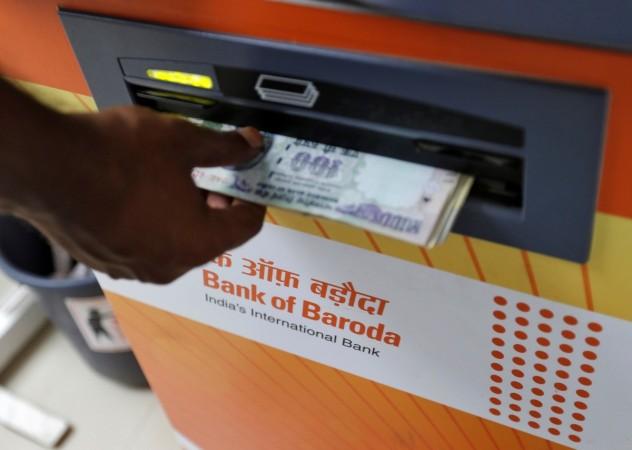
The cash shortage in ATMs and bank branches, which started last month in Telangana and Andhra Pradesh, is spreading fast across India. The central government and the Reserve Bank of India are fighting fire with alacrity. The RBI has formed a committee to fix the issue as soon as possible while the finance ministry has sought three days to bring normalcy back to banking.
ATMs across India are running dry. Small businesses are hit. The persisting blockage in liquidity is breeding more mistrust. The optimists and spin doctors say it's festival demand for cash that has triggered the chain of events. Or that it's because Karnataka is going to the polls. Then there is talk of hoarding. Some say the RBI is holding up cash to make digital payments more ubiquitous. It would be a stretch yet to say there's anarchy but there is obviously confusion and lack of clarity.
Unusual shortage of cash in the system was reported more than 45 days ago. However, the latest comments from the finance ministry seems to imply that the issue is more of a cash logistics problem. "We've cash currency of Rs 1,25,000 crore right now. There is one problem that some states have less currency and others have more," Minister of State for Finance S P Shukla said.
However, the RBI statement on the issue differs substantially. The central bank has said the rate of cash withdrawal is higher than the rate of deposits. It said the pattern is more evident in states like Andhra Pradesh, Bihar, Karnataka, Maharashtra, Rajasthan, Uttar Pradesh, Madhya Pradesh and Telangana.
Bankers too agree that such a phenomenon has been in existence. "People are withdrawing money even if they do not need it and keeping it with them," a senior SBI executive from Visakhapatnam told the Indian Express. "Cash is not coming back into the banking system ... We are unable to refill ATMs because people are not depositing in banks," the banker said adding that this phenomenon is experienced by "all banks" since November 2017.
If people are not depositing their money in banks that's a problem. And statistics show this is true. The last financial year saw a steep decline in the rate of bank deposit growth. Deposits grew 6.7 percent as against 15.3 percent growth in the previous year.
The Financial Resolution and Deposit Insurance (FRDI) bill and the controversial bail-in clause in it had created a lot of mistrust and fear among depositors. If anything, the cycle of events that started from demonitization had struck the root of trust. The year 2018 started with a flurry of reports on bank scams, loan malpractices, insider manipulations, nepotism and corruption at the highest levels. It was easy for discerning observers to identity a pattern of loot.
The events at Punjab National Bank and other smaller state-run banks shattered confidence, but a greater shock came when large private banks ICICI and Axis, along with their iconic woman bosses, came under the shadow of alleged malpractices.
It looked like trust in banks touched a new low. The failure of trust stems from the banks' sins. And trust will return only when banks bring probity and integrity back into the system and throw out the corrupt -- bosses and officers alike. Trust is not going to be restored until the sins are atoned for. Like the Bishop of Rochester said during a particularly ugly phase of the serial wars between England and France, the sins are too grave now.
"I fear that because of all our sins, our kingdom has decayed and collapsed, and God, who used to be English, has withdrawn from us," he said. The bishop was probably drumming up support for war as a national enterprise, and asking people to leverage that single most effective capital they knew thus far - piety. He must have meant that god will win wars for the English again when the sins of the French exceeded theirs.
Well, a medieval sermon will not help cure the rot in the banking system. But it's better the bankers realize that their gods (is customer still the god?) are leaving them because of their sins.
Trust is a key social investment, something our banks have spectacularly frittered away. Of course banking is not the only institution that has diluted the trust quotient. As Francis Fukuyama rightly said, "a nation's well-being, as well as its ability to compete, is conditioned by a single pervasive cultural characteristic: the level of trust inherent in the society." [Trust: The Social Virtues and The Creation of Prosperity]
Trust in banks also determines how much a nation saves. This is far more relevant for developing economies such as India. The growth in China and much of East Asia was fuelled by decades of high savings. It's only recently that India caught up with the Asian peers in terms of the national savings rate. It now looks like we are about to lose that advantage.
According to data from CEIS, India's gross savings Rate in 2017 was 30 percent. From 1951 to 2017 the average savings rate was 18.8 percent. In comparison, the average gross savings rate in China during that period was nearly double, at 36.7 percent. China's savings rate in 2017 was a stupendous 46.4 percent.
India's years of above average savings correlated with the periods of high growth as well. An RBI report clearly says empirical data in India shows that higher domestic saving boosts economic growth.
In India, more than half of the nation's gross savings are held in bank deposits. The diversification away from traditional savings methods is still a work in progress. That's why a decline of trust in banks impacts the savings rate hugely. Eight years ago, India's gross savings rate was at a high of 37 percent. The rate has been on the decline, and the trust problem with banks can hurt it further.

















